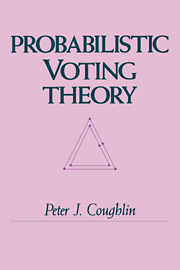Book contents
- Frontmatter
- Contents
- Acknowledgments
- 1 Majority rule and models of elections
- 2 Income redistribution and electoral equilibria
- 3 Properties of the redistributional equilibria
- 4 A more general election model
- 5 Concave social and candidate objective functions
- 6 Directional, stationary, and global electoral equilibria
- 7 Epilogue
- References
- Index
2 - Income redistribution and electoral equilibria
Published online by Cambridge University Press: 05 November 2011
- Frontmatter
- Contents
- Acknowledgments
- 1 Majority rule and models of elections
- 2 Income redistribution and electoral equilibria
- 3 Properties of the redistributional equilibria
- 4 A more general election model
- 5 Concave social and candidate objective functions
- 6 Directional, stationary, and global electoral equilibria
- 7 Epilogue
- References
- Index
Summary
Aranson and Ordeshook (1981) have pointed out that “the fragility of spatial models is apparent in the context of redistribution.” Phrasing their observation more precisely, they go on to state that (by their nature) “elections entailing issues of pure redistribution are overwhelmingly characterized by disequilibrium.” Mueller (1982) has also made the same basic observation, stating: “Political instability seems likely… when issues or platforms are constrained to distributional issues.” To make sure that no one mistakenly thinks that these observations have little relevance, Aranson and Ordeshook (1981) also stated that “most imaginable elections allocating private goods are precisely elections entailing redistributive issues,” and Mueller (1982) added: “redistribution emerged as a major political issue in Europe during the 1970s just as it did in the United States in the 1960s.” This view was stated even more emphatically in Mueller (1983), where he wrote: “Since the mid-1960s, redistribution has emerged in virtually every developed country as the political issue.”
In Section 2.1, a model of elections is specified in which, when deciding for which candidate to vote, voters are primarily concerned with the redistributional consequences of the outcome of the election. In the formulation of this model it is explicitly acknowledged that, though voters may be primarily concerned with what their income (or the income of similar individuals) will be after the election, candidates usually do not directly communicate in detail just what income distribution can be expected if they are elected. Rather, candidates usually concentrate on communicating their positions on the issues of the day and let the voters infer what income distribution they can expect after the election.
- Type
- Chapter
- Information
- Probabilistic Voting Theory , pp. 25 - 50Publisher: Cambridge University PressPrint publication year: 1992



